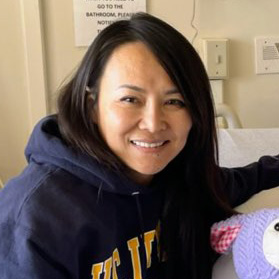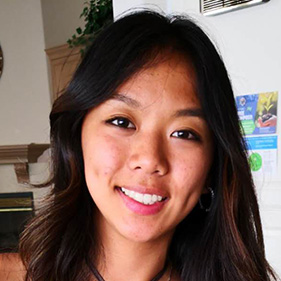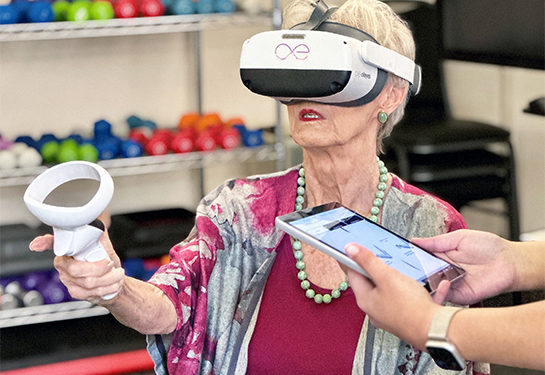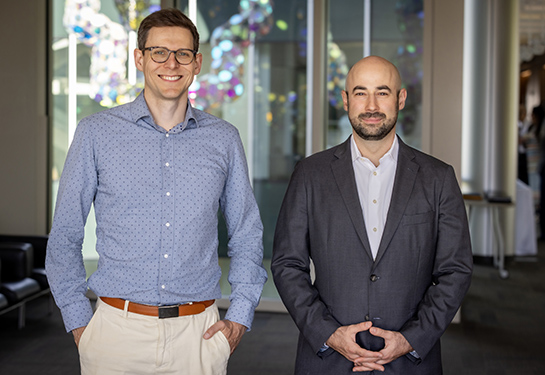College student recovers from stroke, sets sights on becoming a doctor
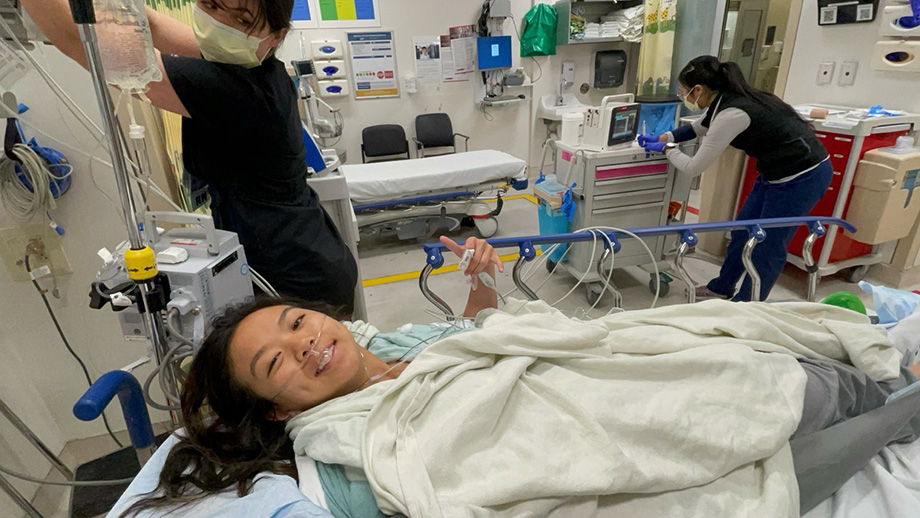
Eighteen-year-old Chloe Barr awoke suddenly in the middle of the night and ran to the bathroom. She needed to urinate but then immediately began throwing up. It must be food poisoning, she thought.
Chloe started to feel weak, falling to her left and hitting her head on the wall. She went back to her room to try and sleep it off but couldn’t get her legs on the bed. An overwhelming scent overtook her. She buried her head under the blanket to get rid of it.
“I smelled paint fumes. Like someone had freshly painted my room and it's drying. That's the only way I can describe it,” Chloe recalled. “I knew that was just not right. Then after that, everything on my face begins to tickle. I had a terrible headache, too.”
The smell Chloe experienced is called phantosmia, or olfactory hallucinations. It’s the perception of smells that aren't present and can be caused by a variety of factors — including neurological conditions. What was happening to Chloe?
It started as an average day
It was March 2023 and Chloe had just arrived home on spring break from UC Irvine. She was enjoying her freshman year and relieved to have completed her second-quarter finals. At home in Davis with her parents and siblings, Chloe had spent the day like many others before, hanging out with her brothers and paying a visit to her grandmother’s house.
That night, her life, as she knew it, took a turn.
It was so scary. We jumped out of bed and put our daughter in the car to take her to the ER.” —Helen Barr, Chloe’s mom
Having woken up so abruptly and with “paint fumes” still overwhelming her, Chloe was alarmed and in a daze. Somehow she managed to make her way to her parents’ bedroom, bumping into the wall along the way. She woke her father first and told him what had happened. He took one look at her and knew she was having a stroke.
Chloe’s father had a stroke when he was 34 and recognized the symptoms immediately.
“It was so scary. We jumped out of bed and put our daughter in the car to take her to the ER,” said Helen Barr, Chloe’s mom.
An excruciating headache gets worse
The family hurriedly made the short drive to their local hospital. By this time, Chloe’s excruciating headache had worsened. In the emergency room she remembers feeling like she was in a dream.
“I couldn’t make sense of what was happening,” Chloe said. “I was in and out of consciousness. It felt impossible. Unreal.”
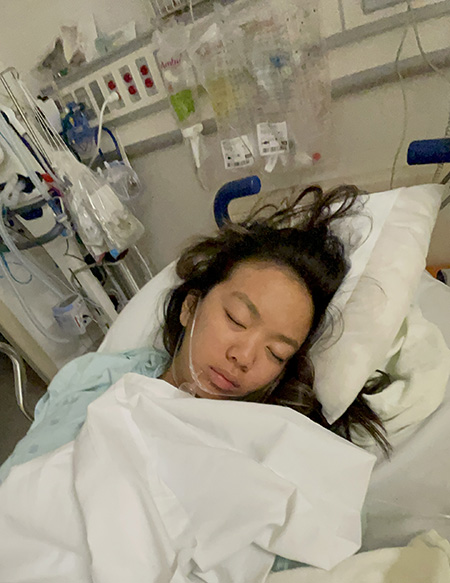
Chloe underwent CT scans and then the doctor put her through some tests. That’s when she was jolted back to reality.
“I could see him touching my leg, but I could not feel it,” Chloe said. “I thought, ‘Oh my gosh. Something is definitely wrong.’”
Bleeding on the brain leads to care at UC Davis Medical Center
CT scans revealed bleeding in Chloe’s brain. An arteriovenous malformation, or AVM, had ruptured.
An AVM is an abnormal tangle of blood vessels that causes potentially life-altering problems with the connections between arteries and veins. These blood vessels can weaken and burst, spilling blood into the brain, causing stroke and brain damage. The greatest potential danger posed by AVMs is hemorrhage. That is what happened to Chloe.
“By this time, she had lost complete motor skills on the whole left side of her body and went blind in one eye,” said Helen. “I can't even find the words to describe how I felt other than I couldn’t believe it.”
Chloe needed a higher level of specialty care. Fortunately, UC Davis Medical Center — its neurology and neurosurgery program ranked 28th best in the nation by US News & World Report — was nearby.
Even in the ambulance, I still didn't have a full grasp of things. I had no idea what I’d be facing.” —Chloe Barr
Chloe was rushed to the Sacramento hospital by ambulance, still in a state of shock.
“Even in the ambulance, I still didn't have a full grasp of things,” Chloe said. “I had no idea what I’d be facing.”
A difficult decision looms
When Chloe arrived at UC Davis Medical Center, she was immediately admitted to the Intensive Care Unit. Medical decisions needed to be made. Because she was 18, Chloe had the ultimate say in what happened next, but her parents were by her side to help her make sense of what was happening.
UC Davis vascular neurosurgeon Ben Waldau presented Chloe with two options: heal naturally, knowing the unfavorable odds of the AVM likely reforming and rupturing again; or, brain surgery.
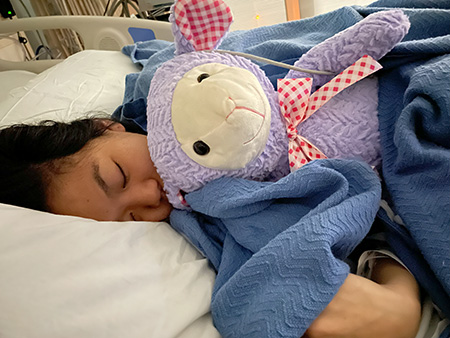
“Brain surgery is never a fun option, especially with the possible side effects like paralysis, vision loss or other life-altering complications,” Chloe said. “But the idea that I had a ticking time bomb in my head, I was like, ‘Do I want to wait around for it to rupture again?’”
She chose surgery. Chloe’s parents agreed it was the right choice.
“Dr. Waldau answered all our questions, and we had a lot of them,” Helen recalled. “He laid out the facts and told us exactly what we were dealing with. That’s just what we needed.”
A gifted surgical team provides exceptional care
Just before going into surgery that Monday, Chloe remembers the nurse holding her hand.
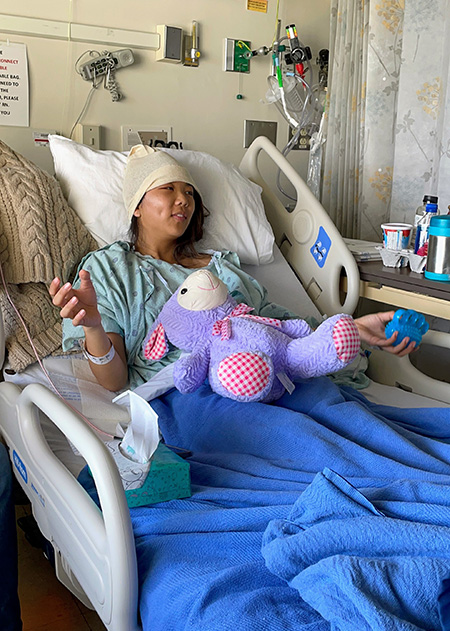
“I was very scared. Terrified. But then she held my hand,” Chloe said. “It was a very comforting feeling.”
After a 5-hour procedure to remove the AVM, Chloe remembers waking up with an intense need to show gratitude to the people on her care team.
“I was like, I’m still here. I'm alive,” Chloe said. “I felt everyone deserved a thank you.”
She and her parents feel especially grateful to Waldau and his team.
“Our family will always be grateful to the UCDMC team and Dr. Waldau for their exceptional care during Chloe’s stay,” Helen said. “We knew she was in the best hands from the moment she arrived. Dr. Waldau’s skill, compassion and dedication made all the difference, and we can’t thank him and his team enough.”
Recovery and taking next steps, literally
The months that followed Chloe’s surgery were not easy. She had to take a quarter off as she re-learned to walk, talk, and read. But as an athlete, Chloe used her competitive drive and determination, as well as her support system, to overcome her challenges.
“It’s truly remarkable to reflect on all that I’ve been able to accomplish,” Chloe said. “While I still experience headaches and occasionally struggle with slurred speech as a lingering effect of the stroke, I’ve learned to persevere and thrive.”
Her mom, Helen, says Chloe’s strong will has been helpful for the dramatic journey.
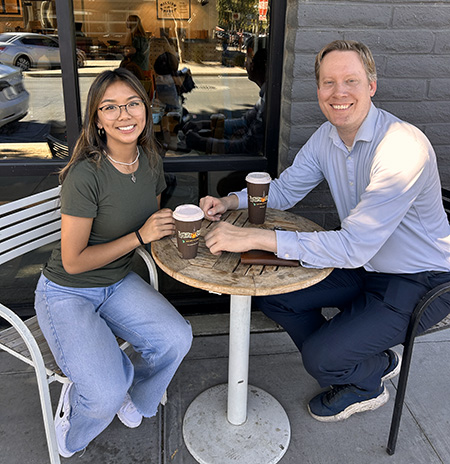
“She showed incredible strength throughout her recovery these past couple of years,” Helen said. “She never gave up, even when the challenges seemed overwhelming. Watching her overcome every obstacle during her recovery has made us so proud.”
Now Chloe is a third-year biological sciences major who plans to pursue a career in medicine.
Chloe looks forward to what lies ahead, including the opportunity to reconnect with the man who helped save her life.
“I’ve reached out to my neurosurgeon, Dr. Waldau, and I plan to shadow him this summer,” Chloe said. “I’m excited about the future. We’ll see where life takes me from here.”
UC Davis Medical Center is a comprehensive academic medical center where clinical practice, teaching and research converge to advance human health. Centers of excellence include the National Cancer Institute-designated UC Davis Comprehensive Cancer Center; the region's only Level 1 pediatric and adult trauma centers; the UC Davis MIND Institute, devoted to finding treatments and cures for neurodevelopmental disorders; and the UC Davis Children's Hospital. The medical center serves a 33-county, 65,000-square-mile area that stretches north to the Oregon border and east to Nevada. It further extends its reach through the award-winning telemedicine program, which gives remote, medically underserved communities throughout California unprecedented access to specialty and subspecialty care. For more information, visit medicalcenter.ucdavis.edu.

